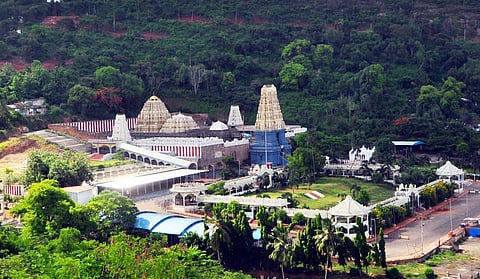

VISAKHAPATNAM: Visakhapatnam is positioning itself as a prime candidate for its inclusion into the UNESCO Global Geoparks Network, thanks to its rich geological heritage. The Geological Survey of India and the Indian National Trust for Art and Cultural Heritage (INTACH) have been advocating for the creation of geoparks across the country, and Visakhapatnam with its diverse and ancient rock formations stands out as the potential runner for the spot.
However, to secure the coveted Geopark status, the district must rank among the top two nominees in India.
Visakhapatnam, a rich district of geological wonders spanning over 1,500 million years, is a prime candidate for a geopark. It features all three key components: offshore components, shore components, including Rushikonda Blue Flag Beach with Gosthani River Delta, and terrestrial geological sites.
Despite their significance, many of these sites reel under official neglect and threats from unregulated tourism. A UNESCO Global Geopark is a single, unified area where sites of geological significance are sustainably managed and preserved, with a focus on education, conservation, and economic development. If granted, Visakhapatnam would not only be recognised for its geological importance but would also become a model for sustainable development in India, attracting international tourism and educational opportunities.
Dr D Rajasekhar Reddy, convenor of INTACH and a retired geology professor, stressed the urgency of preserving these sites. "Uncontrolled tourism, pollution, and erosion, especially on the beaches, are threatening the district's geography. Key locations like Erra Matti Dibbalu and Borra Caves are under significant pressure, both from tourists and real estate development. These sites could lose their scientific and aesthetic value if immediate steps are not taken to protect them," he explained.
Dr Reddy emphasised that any development around these sites should be preceded by comprehensive impact assessments. "Geological sites, once lost, are lost forever," he noted, highlighting the irreversible nature of damage to such areas. To ensure the protection and sustainable development of these important sites, Dr Reddy has called for the establishment of a Geopark Management Authority (GPMA) to oversee the integration of major geological and cultural sites such as Erra Matti Dibbalu, Borra Caves, Thotlakonda, and others into a unified geopark. "By bringing all the significant locations under one umbrella, we can ensure their proper management and promote responsible tourism," Dr Reddy added.
The region is home to geological marvels and key archaeological sites like Thotlakonda, Bavikonda, and Bojjannakonda. Notable landmarks include Kambalakonda Wildlife Sanctuary, the Old Cemetery, the Three Holy Hills promoting religious harmony, and the historic Simhachalam Temple, enriching its cultural and spiritual significance.
Creating a geopark would also boost local economies by promoting the development of tourism infrastructure and local industries. Dr Reddy suggested that local products, reflecting the native skills of the region, could be marketed as souvenirs. "The Geopark Management Authority could ensure the promotion of local products and cuisines and the development of facilities like tourist information centres, trained guides, and adequate amenities at the sites," he said.
Dr Reddy believes that Visakhapatnam has the potential to lead the way in geopark development, not only setting an example for other states but also enhancing international tourism. "If Visakhapatnam is recognised as a UNESCO Geopark, it would bring international attention and boost the region's economy," he said, adding, "But achieving this goal requires collaboration from all stakeholders-government, local communities, and the public-to preserve these invaluable sites for future generations."
With its rich blend of geological, cultural, and historical significance, Visakhapatnam is a rightful contender for UNESCO Global Geopark recognition. But the road to achieving this status requires sustained effort, mainly from the government, with support from all sectors of society to ensure that these treasures are preserved and promoted responsibly.